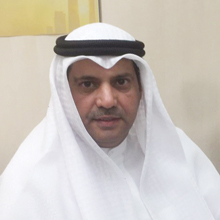 Fourth constituency
Fourth constituencycandidate Faraz Al-Mutairi
KUWAIT: As part of its series of interviews with candidates ahead of next Saturday's National Assembly elections, Kuwait Times spoke with fourth constituency candidate Faraz Mohammed Faraz Al-Mutairi, who spoke about the electoral system, the state's budget, citizenship withdrawal, bedoons (stateless residents) and other topics. The following are excerpts from the interview:
Kuwait Times: What is the main reason behind your decision to run for elections?
Faraz Al-Mutairi: I have been involved in public service for long. I used to be a Municipal Council member and am well-informed about many major issues like housing and development projects. I know that true legislating and monitoring of the executive power can only be done through the parliament, especially after the weakening of the municipal council.
KT: What do you think of the one-vote electoral system?
Mutairi: Whether we agree or disagree with the election law, attempts to change it from outside the parliament proved to be futile. Change must come from within the parliament and I plan to adopt this issue if I make it, God willing.
KT: Will you work on amending it?
Mutairi: Definitely. This law does not reflect the true meaning of democracy and representation of all social groups according to their actual size. We represent a social majority and ought to be represented in parliament. Respecting minorities does not mean not respecting majorities.
KT: What are the main issues you will tackle?
Mutairi: There are many, but each of them will be discussed according to priority. I am mainly concerned with economic issues and resolving the budget deficit with strong emphasis on refusing to do so through citizens' pockets. Whenever a government adopts economic reforms, it usually starts with transparency in project execution, then imposing taxes on companies, and finally rationalization by lifting subsidies given to better off consumers. Unfortunately, the government started backwards.
I will also tackle the withdrawal of citizenships, which should not be subject to conflicts or settling scores. Those who erred should be held accountable.
KT: What do you think of the previous parliament?
Mutairi: My opinion might not be impartial, but it is obvious that people are dissatisfied with the previous parliament's performance because it did not stand up for major concerns and issues and failed to protect public gains from decisions such as increasing petrol prices.
KT: How do you view the participation of the opposition that had boycotted previous elections?
Mutairi: There is enough room for everybody. There are various political ideologies, and after all, it is the people who will select their representatives in parliament.
KT: What percentage of change do you expect in the coming parliament?
Mutairi: I expect a very high turnover of up to 80 percent. I do not think any particular bloc will win a majority. I rather expect a parliamentary majority with certain agendas and not a political one.
KT: What percentage of participation do you expect? Why?
Mutairi: I expect turnout to increase to 70 percent.
KT: What is the basis of your electoral program and how many issues will you adopt?
Mutairi: In such a tense political situation, I expect that protecting constitutional gains and citizens' privileges will be on top of my priorities, in addition to what I previously said about my economic vision.
KT: Is the bedoon issue on your electoral program?
Mutairi: This issue has humane, religious and patriotic aspects. It ought to be resolved, because there are people who deserve to be immediately granted citizenship. Others deserve decent living, health and educational care and to be prioritized before expats in employment.
KT: What do you think of the DNA law?
Mutairi: This law was stillborn and is unconstitutional. It is against the sharia and we thank HH the Amir for ordering to suspend it.
KT: What is your impression about writing off loans?
Mutairi: There are many bad debtors and a logical solution has to be found, because rescheduling the loans is not enough. The state must contribute by dropping the interest that forms a great portion of the loan.
By Meshaal Al-Enezi










